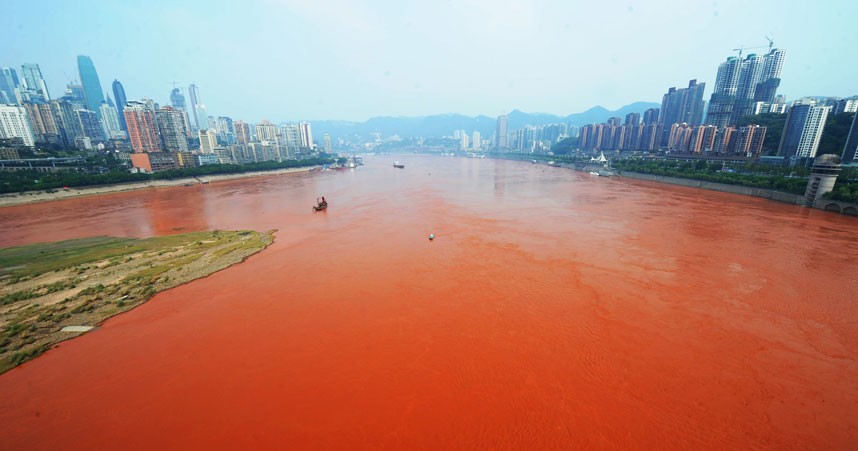What Can Cause A River To Run Red?
How can this happen? How can a river or large body of water almost instantaneously turn red?
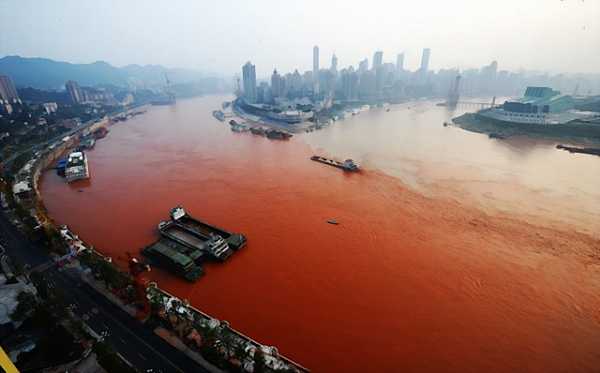
Bodies of water turning red is no longer an unheard of phenomenon. Reports of red rivers, lakes, coastlines, and floods are gracing the headlines of the world’s news outlets with ever growing frequency. But I must wonder how this happens? I looked into it and found that there are a handful of natural causes that can turn massive waterways into the color of blood as well as an almost endless amount of artificial ones.
Natural Causes
Erosion
Massive amounts of soil being deposited into a body of water through erosion can change its color to red if the soil is this hue. This is what the Chongqing local government says may have happened to the Yangtze last month. But, for this to occur, large amounts of rain are usually necessary. Though this part of the Yangtze has a reputation of having a golden hue because of the continuous rains that it receives, having it run red because of this has up to now been unheard of.
“China is well known for having areas with a lot of steep hill sides and a lot of land use practices that promote soil erosion and soil going into rivers,” she said. “You can get red-colored clays that wouldn’t be a whole lot different from having a big dose of dye go in there. But if that’s the cause I’d imagine there would have had to be a huge storm or a huge amount of clay go into the system.” -Emily Stanley, professor of limnology, University of Wisconsin
Red Tide
Red tides are events in which estuarine, marine, or fresh water algae accumulate rapidly in a body of water, resulting in its discoloration at the surface — sometimes turning it purple, pink, red, or green. Some red tides are associated with the production of natural toxins or the depletion of dissolved oxygen.
Because rivers are moving constantly and are always mixing with the air, it is not thought that this could be a viable cause for the flamboyant coloration of the Yangtze last month.
Increased Salination
In August, a lake in the Camargue wetland region of France suddenly turned blood red. Environmental scientists say that it was caused by a salt-loving algae called Dunaliella Salina, which produces a red pigment that absorbs and uses the energy of sun to order to create more energy. This happened because of an increase in the lake’s salt content which caused the brine shrimp to die and the saline algae to proliferate at an abnormal rate, changing the entire lake’s color.
Decreased Oxygen
A lake in San Angelo State Park in Texas turned red in 2011, but, contrary to what many local residents had to say, it was not a sign of the end of the world. The red coloration occurred during a time of drought, and the lake stagnated and began drying up, decreasing its dissolved oxygen level. Chromatiaceae bacteria, which thrives in oxygen depleted waters, took advantage of the situation and covered the lake, turning it red.
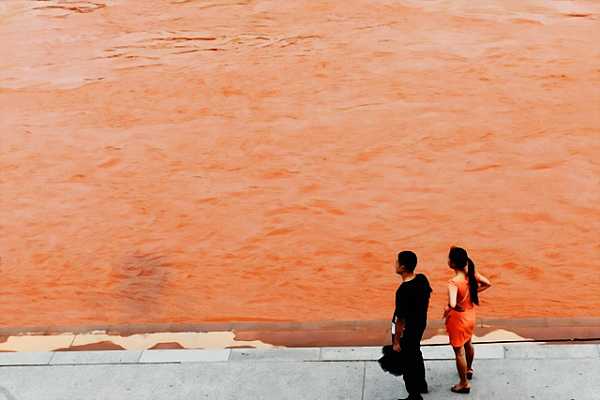
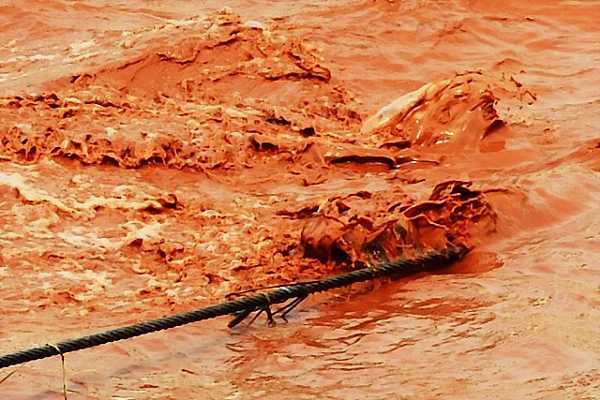
Pollution
Dumping of sediments
Like erosion, if massive amount of sediments are dumped into a river or lake they can have the effect of temporarily turning it another color. If these sediments are red — such as some types of clay or sand — then the body of water can temporarily take on this hue.
Red Sludge
As part of the Bayer process, which is the principal industrial means of refining bauxite to make alumina for the electrolysis of aluminium, a red mud-like byproduct is inevitably created. If this sludge gets into waterways, it can cause them to turn red.
This happened in 2010 in Hungary, as a reservoir dam broke, releasing a million cubic meters of toxic red sludge which overtook nearby towns and got into the local water system, including the Danube.
Dye Dumping
In 2011, the Jian River ran blood red through Luoyang, a city in China’s Henan province. The cause was due to an illegal factory which made red dye for firework wrappers dumping their waste products directly into the city’s storm drains, which then emptied into the river. This incident shows that the dumping of dye can drastically change the color of a relatively large body of water.
Miscellaneous Industrial Pollution
There are probably dozens of other ways that industrial pollution could have turned the Yangtze red. Though the local environmental agencies rule out illegal sewage dumping, they did vaguely admit that it may have been caused by industrial pollution and silt churned up by recent upstream floods.
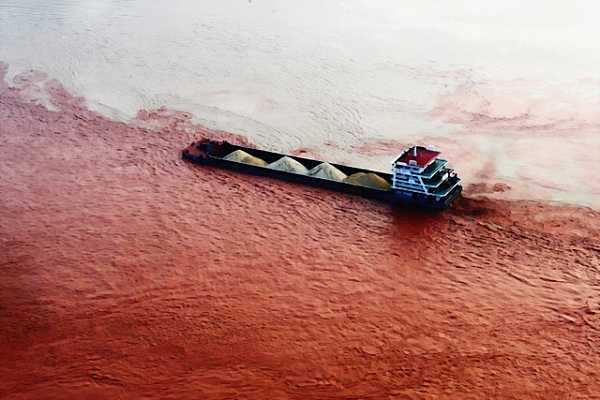
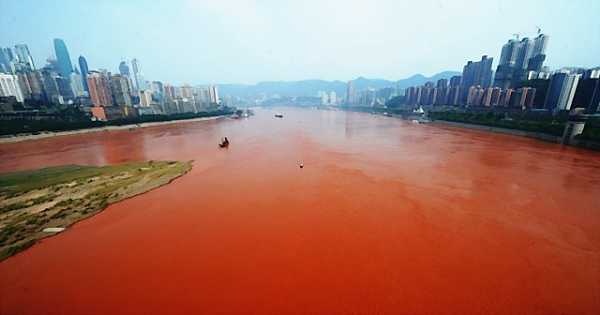
Conclusion
Whenever a body of water turns red, Bible thumpers invariably come out of the woodwork chanting “End game! Apocalypse! It was prophesied!” Unfortunately for them, even if one of these red water occurrences were the ordained sign they’ve been waiting for it would be difficult to recognize it. In point, we live in an era where bodies of water sometimes turn the color of blood. Sometimes it’s natural, sometimes it’s a natural reaction to human actions, and sometimes it’s just down right pollution. I’m unsure if these events can be credited to the hand of an omnipotent God, but, taken collectively, they may be a sign of some kind of downward spiral none the less.
Life continued as normal in the tomato soup colored Yangtze — people fished, cargo ships made deliveries, and pedestrians promenaded along its banks. It seems as if the situation came and went as a blip in the long history of China. This is perhaps one of the strangest things of all: in this day and age a river can run red and not provoke hysteria, and, rather than causing mass migration, people go to its banks, take pictures and collect samples as souvenirs.
As I’ve found, many things can cause a river to turn color, and while it’s true that the Yangzhe’s drastic red coloration could have been a natural or quasi-natural occurrence, if this were the case it would have been an extreme oddity for sure. This river does not run red very often — if ever before — and the Chinese probably have the records to prove it. When a large river turns red, people remember it.
The silence on the part of the local government on the red Yangtze issue speaks volumes, and it seems as if this is another situation like the mysteriousbooms in Jiangsu province last month or the strange smog cloud that covered the entire eastern part of the country in June. Inevitably, the question rises to the surface: do the officials really not know the cause of this or are they just not telling? You do not have to be a wack-job conspiracy theorist to continuously ask this here in China. Somehow, “It was from sand being washed into the river upstream,” seems to stretch the bounds of plausibility.
